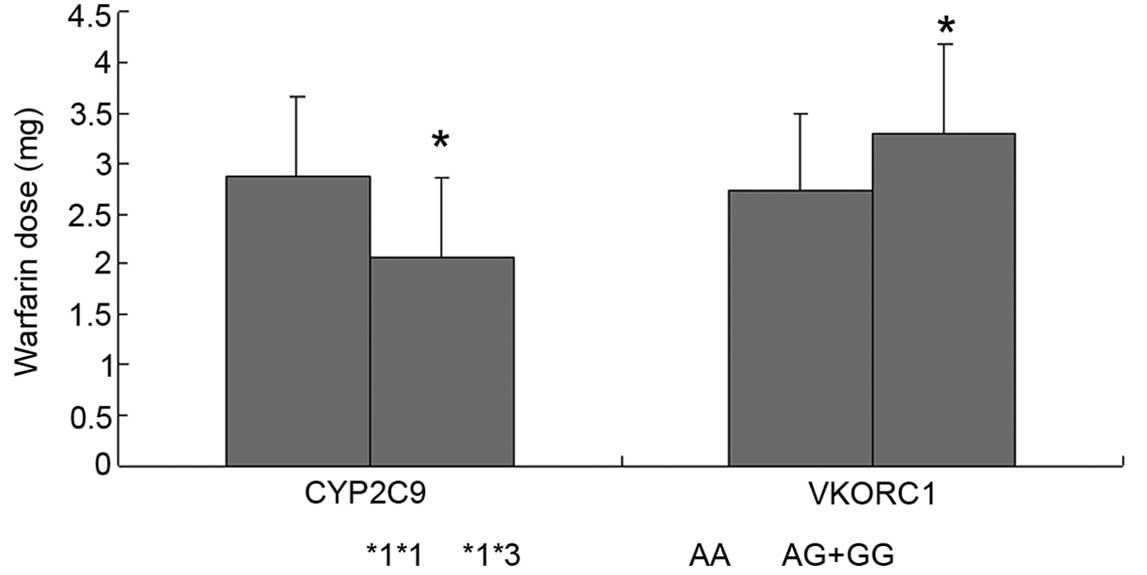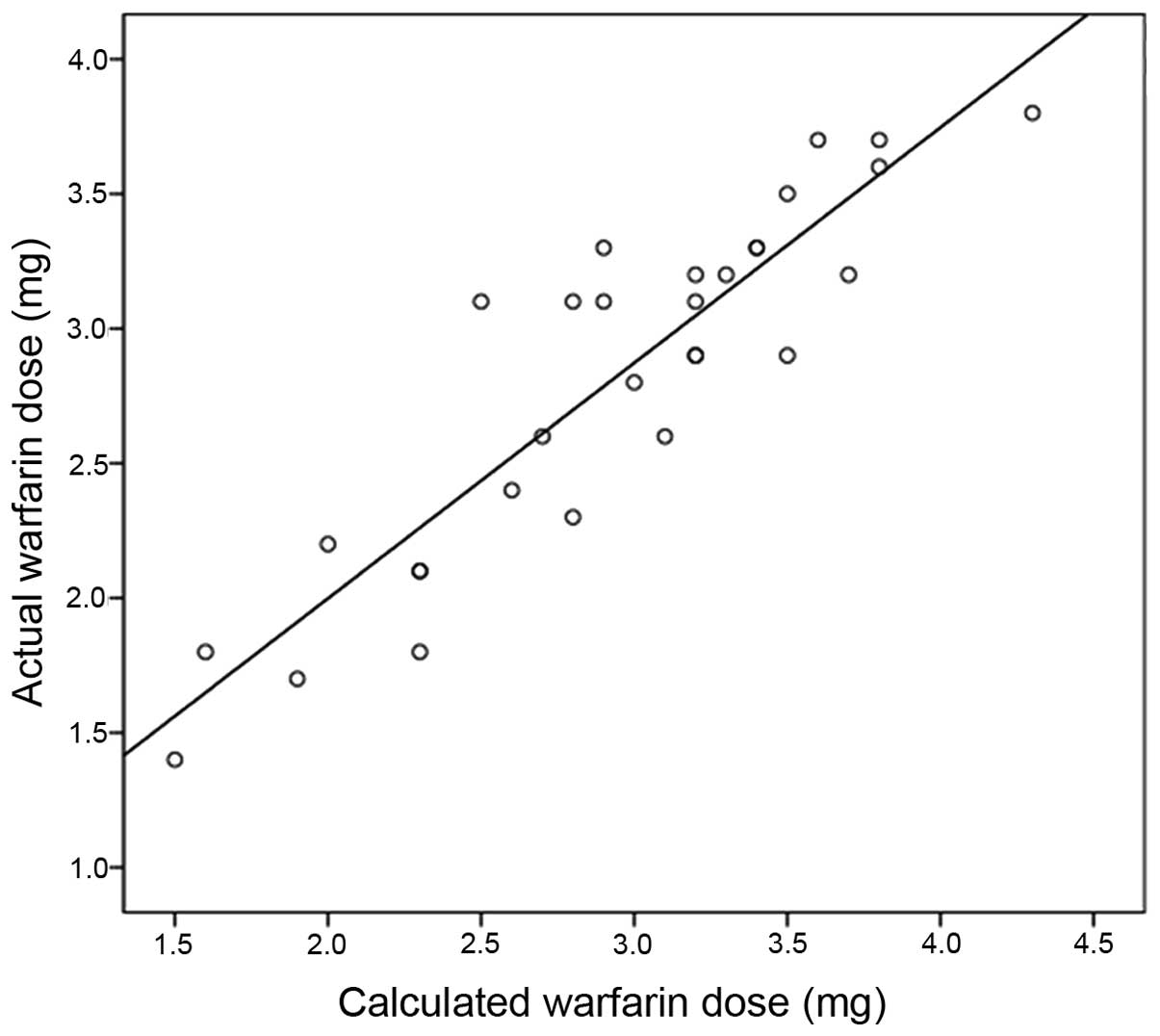|
1
|
Ansell J, Hirsh J, Poller L, Bussey H,
Jacobson A and Hylek E: The pharmacology and management of the
vitamin K antagonists: The Seventh ACCP Conference on
Antithrombotic and Thrombolytic Therapy. Chest. 126(Suppl 3):
204S–233S. 2004. View Article : Google Scholar : PubMed/NCBI
|
|
2
|
Hirsh J, Guyatt G, Albers GW and
Schunemann HJ: Proceedings of the Seventh ACCP Conference on
Antithrombotic and Thrombolytic Therapy: Evidence-based guidelines.
Chest. 126(Suppl 3): 172S–696S. 2004. View Article : Google Scholar : PubMed/NCBI
|
|
3
|
Lam MP and Cheung BM: The pharmacogenetics
of the response to warfarin in Chinese. Br J Clin Pharmacol.
73:340–347. 2012. View Article : Google Scholar : PubMed/NCBI
|
|
4
|
Hawes EM and Viera AJ: Anticoagulation:
Monitoring of patients receiving anticoagulation. FP Essent.
422:24–30. 2014.PubMed/NCBI
|
|
5
|
No authors listed: Effect of long-term
oral anticoagulant treatment on mortality and cardiovascular
morbidity after myocardial infarction. Anticoagulants in the
Secondary Prevention of Events in Coronary Thrombosis (ASPECT)
Research Group. Lancet. 343:499–503. 1994.PubMed/NCBI
|
|
6
|
Cannegieter SC, Rosendaal FR, Wintzen AR,
van der Meer FJ, Vandenbroucke JP and Briët E: Optimal oral
anticoagulant therapy in patients with mechanical heart valves. N
Engl J Med. 333:11–17. 1995. View Article : Google Scholar : PubMed/NCBI
|
|
7
|
Fihn SD, McDonell M, Martin D, Henikoff J,
Vermes D, Kent D and White RH: Warfarin Optimized Outpatient
Follow-up Study Group: Risk factors for complications of chronic
anticoagulation. A multicenter study. Ann Intern Med. 118:511–520.
1993. View Article : Google Scholar : PubMed/NCBI
|
|
8
|
No authors listed: Adjusted-dose warfarin
versus low-intensity, fixed-dose warfarin plus aspirin for
high-risk patients with atrial fibrillation: Stroke prevention in
atrial fibrillation III randomised clinical trial. Lancet.
348:633–638. 1996. View Article : Google Scholar : PubMed/NCBI
|
|
9
|
Hirsh J, Dalen J, Anderson DR, Poller L,
Bussey H, Ansell J and Deykin D: Oral anticoagulants: Mechanism of
action, clinical effectiveness, and optimal therapeutic range.
Chest. 119(Suppl 1): 8S–21S. 2001. View Article : Google Scholar : PubMed/NCBI
|
|
10
|
Takahashi H and Echizen H:
Pharmacogenetics of warfarin elimination and its clinical
implications. Clin Pharmacokinet. 40:587–603. 2001. View Article : Google Scholar : PubMed/NCBI
|
|
11
|
Approves Updated Warfarin FDA (Coumadin)
Prescribing information: New genetic information may help providers
improve initial dosing estimates of the anticoagulant for
individual patients. http://www.fda.gov/bbs/topics/NEWS/2007/NEW01684.htmlAccessed.
February 19–2009
|
|
12
|
Mazzaccara C, Conti V, Liguori R, Simeon
V, Toriello M, Severini A, Perricone C, Meccariello A, Meccariello
P, Vitale DF, et al: Warfarin anticoagulant therapy: A Southern
Italy pharmacogenetics-based dosing model. PLoS One. 8:e715052013.
View Article : Google Scholar : PubMed/NCBI
|
|
13
|
Bodin L, Verstuyft C, Tregouet DA, Robert
A, Dubert L, Funck-Brentano C, Jaillon P, Beaune P, Laurent-Puig P,
Becquemont L, et al: Cytochrome P450 2C9 (CYP2C9) and vitamin K
epoxide reductase (VKORC1) genotypes as determinants of
acenocoumarol sensitivity. Blood. 106:135–140. 2005. View Article : Google Scholar : PubMed/NCBI
|
|
14
|
Vecsler M, Loebstein R, Almog S, Kurnik D,
Goldman B, Halkin H and Gak E: Combined genetic profiles of
components and regulators of the vitamin K-dependent
gamma-carboxylation system affect individual sensitivity to
warfarin. Thromb Haemost. 95:205–211. 2006.PubMed/NCBI
|
|
15
|
Aithal GP, Day CP, Kesteven PJL and Daly
AK: Association of polymorphisms in the cytochrome P450 CYP2C9 with
warfarin dose requirement and risk of bleeding complications.
Lancet. 353:717–719. 1999. View Article : Google Scholar : PubMed/NCBI
|
|
16
|
Ekladious SM, Issac MS, El-Atty Sharaf SA
and Abou-Youssef HS: Validation of a proposed warfarin dosing
algorithm based on the genetic make-up of Egyptian patients. Mol
Diagn Ther. 17:381–390. 2013. View Article : Google Scholar : PubMed/NCBI
|
|
17
|
Li X, Liu R, Luo ZY, Yan H, Huang WH, Yin
JY, Mao XY, Chen XP, Liu ZQ, Zhou HH, et al: Comparison of the
predictive abilities of pharmacogenetics-based warfarin dosing
algorithms using seven mathematical models in Chinese patients.
Pharmacogenomics. 16:583–590. 2015. View Article : Google Scholar : PubMed/NCBI
|
|
18
|
Scibona P, Redal MA, Garfi LG, Arbelbide
J, Argibay PF and Belloso WH: Prevalence of CYP2C9 and VKORC1
alleles in the Argentine population and implications for
prescribing dosages of anticoagulants. Genet Mol Res. 11:70–76.
2012. View Article : Google Scholar : PubMed/NCBI
|
|
19
|
Voora D, Eby C, Linder MW, Milligan PE,
Bukaveckas BL, McLeod HL, Maloney W, Clohisy J, Burnett RS, Grosso
L, et al: Prospective dosing of warfarin based on cytochrome P-450
2C9 genotype. Thromb Haemost. 93:700–705. 2005.PubMed/NCBI
|
|
20
|
Senoo K, Lane D and Lip GY: Stroke and
bleeding risk in atrial fibrillation. Korean Circ J. 44:281–290.
2014. View Article : Google Scholar : PubMed/NCBI
|
|
21
|
Lip GY and Lane DA: Stroke prevention in
atrial fibrillation: A systematic review. JAMA. 313:1950–1962.
2015. View Article : Google Scholar : PubMed/NCBI
|
|
22
|
Zhou SF, Zhou ZW and Huang M:
Polymorphisms of human cytochrome P450 2C9 and the functional
relevance. Toxicology. 278:165–188. 2010. View Article : Google Scholar : PubMed/NCBI
|
|
23
|
Vogl S, Lutz RW, Schönfelder G and Lutz
WK: CYP2C9 genotype vs. metabolic phenotype for individual drug
dosing - a correlation analysis using flurbiprofen as probe drug.
PLoS One. 10:e01204032015. View Article : Google Scholar : PubMed/NCBI
|
|
24
|
Li S, Zou Y, Wang X, Huang X, Sun Y, Wang
Y, Dong L and Jiang H: Warfarin dosage response related
pharmacogenetics in Chinese population. PLoS One. 10:e01164632015.
View Article : Google Scholar : PubMed/NCBI
|
|
25
|
Oldenburg J, Watzka M, Rost S and Müller
CR: VKORC1: Molecular target of coumarins. J Thromb Haemost.
5(Suppl 1): 1–6. 2007. View Article : Google Scholar : PubMed/NCBI
|
|
26
|
Rost S, Fregin A, Ivaskevicius V,
Conzelmann E, Hörtnagel K, Pelz HJ, Lappegard K, Seifried E,
Scharrer I, Tuddenham EG, et al: Mutations in VKORC1 cause warfarin
resistance and multiple coagulation factor deficiency type 2.
Nature. 427:537–541. 2004. View Article : Google Scholar : PubMed/NCBI
|
|
27
|
Harrington DJ, Gorska R, Wheeler R,
Davidson S, Murden S, Morse C, Shearer MJ and Mumford AD:
Pharmacodynamic resistance to warfarin is associated with
nucleotide substitutions in VKORC1. J Thromb Haemost. 6:1663–1670.
2008. View Article : Google Scholar : PubMed/NCBI
|
|
28
|
Yang L, Ge W, Yu F and Zhu H: Impact of
VKORC1 gene polymorphism on interindividual and interethnic
warfarin dosage requirement-a systematic review and meta analysis.
Thromb Res. 125:e159–e166. 2010. View Article : Google Scholar : PubMed/NCBI
|
|
29
|
Sconce EA, Khan TI, Wynne HA, Avery P,
Monkhouse L, King BP, Wood P, Kesteven P, Daly AK and Kamali F: The
impact of CYP2C9 and VKORC1 genetic polymorphism and patient
characteristics upon warfarin dose requirements: Proposal for a new
dosing regimen. Blood. 106:2329–2333. 2005. View Article : Google Scholar : PubMed/NCBI
|
















